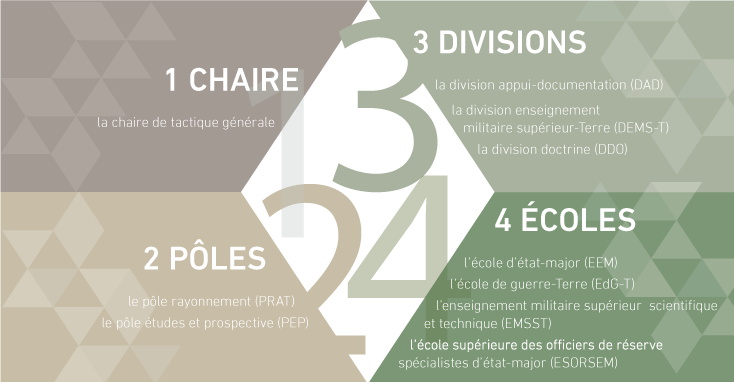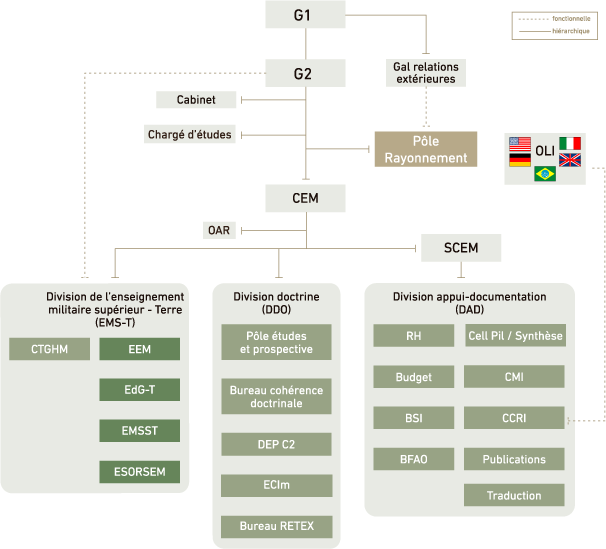The CDEC
Centre for Doctrine and Command Education
It is a reference point for the Army's employment doctrine, a guarantor of higher military education on the land and a vector of influence. Its general purpose is to promote military thinking for the benefit of the operational effectiveness of the land forces.
The CDEC's 3 missions
1\ ANTICIPATING EMPLOYMENT, GUARANTEEING A DOCTRINAL FRAMEWORK adapted to current and future land forces commitments
develop and ensure the overall coherence of the doctrine for the employment of land forces networked with the doctrinal community, in particular the DEPs of the commands and pillars of the army ;
guarantee the doctrinal interoperability of the Army with that of our allies;
coordinating the Army's RETEX function;
ensure the expertise of the operational command function;
to steer and conduct prospective studies and research for the benefit of doctrine and tactical anticipation;
exercising a watch and anticipation function and coordinating its action across all commands.
2 \ ENSURE THE TRAINING of tomorrow's Army decision-makers
to provide higher military education on land in order to prepare future active and reserve military leaders for high command responsibilities, or for leadership positions requiring a high level of scientific or technical qualifications ;
to teach the fundamentals of staff work in the framework of young captains' staff training before TCUE (Joint Qualification Level One - JQ1), post-TCUE (Joint Qualification Level Two - JQ2), NCO staff training and the Senior Officer Qualification Diploma (SOD);
to train active officers, entering the higher military education of the 2nd degree (EMS2), to exercise important command responsibilities
joint forces in operations or in the organic domain (EdG-T) ;
train NCOs and reserve officers for staff employment up to the reserve MSE2 level (ESORSEM);
preparing and then educating officers entering MSE1 or MSE2 in the scientific and technical streams (MSTSE).
3 \ ENHANCE MILITARY THINKING
formatting, translating, publishing and distributing CDEC publications;
develop, implement or support the development of outreach tools intended for an audience of decision-makers and influencers;
produce and disseminate elements of enlightenment and understanding to internal army relays.
DEFINITION OF DOCTRINE: Land Forces Employment Doctrine brings together all the rules that govern the engagement of these forces in a theatre of operations, a "common way of seeing things" (Marshal FOCH).
ORGANIZATION


The Doctrine Division (DDO) is responsible for coordinating the doctrine and RETEX functions within the Army.
TheDocument Support Division (DSD) administers and supports the CDEC. It is responsible for the editing and distribution of the documentation.
The Army'sHigher Military Education Division (DEMS-T) is a continuation of the education provided in the training schools. It trains officers and non-commissioned officers of the Army in staff methods, procedures and techniques.
The Study and Prospective Studies (PEP) is in charge of studies and prospective studies, primarily in the field of the use of forces. It produces exploratory documents enabling doctrinal anticipation.
The Armed Forces Outreach Unit (PRAT). Directly attached to the General Officer for External Relations (OG-RE), the Armed Forces Outreach Unit is oriented towards civil society.
The Chair of General Tactics at the CDEC aims to develop the Army's skills in the field of general tactics, while promoting undisputed expertise in terms of reflection on the modalities of engagement in the air-land environment.
The CDEC implements higher military education at the first and second levels and command education in the Land Army, in the four schools subordinate to it: the Land Warfare School (EdG-T), the Higher Military Scientific and Technical Education (EMSST), the Higher School for Staff Specialist Reserve Officers (ESORSEM) at the Military School in Paris, the Staff School (EEM) in Saumur.
It participates, under the functional authority of the DRHAT, in designing the general policy of higher military education in the French Army and guarantees the coherence of this education with the continuum of training of officers and non-commissioned officers in the French Army as well as with the higher military education of 2nd and 3rd degrees provided in joint forces.
The Staff School (EEM). The staff school is the heir to the "higher course of warfare and staff officers" founded by the Duke of Choiseul in 1766 and initially commanded by Lieutenant-General de Bourcet, who developed the first method of tactical reasoning.
The School of War-Land (EdG-T). The School of War-Land is part of the historical continuity of the Ecole Supérieure de Guerre (ESG), created in 1876, then of the Cours Supérieur d'Etaff (CSEM). It is the essential crucible for the Army's commissioned officers, a centre of reference and excellence in the training and selection of senior military officers.
Higher military scientific and technical education (EMSST). Created in 1947, the mission of the EMSST is to train tomorrow's military leaders, all selected through a competitive process to hold high responsibility jobs requiring scientific, technical or linguistic skills. At the heart of higher military education, the EMSST, by adapting it if necessary through partnerships, matches civilian training provision with the needs of the Army.
The main mission of theHigher School for Staff Specialist Reserve Officers (ESORSEM) is to design, organise and conduct the training of reserve officers' curricula.





